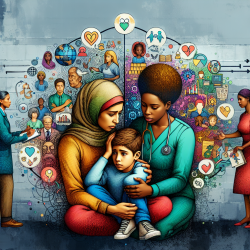Introduction
As a Special Education Director, the responsibility of ensuring the mental well-being of students is paramount. The recent study titled Randomized Evaluation of a School-Based, Trauma-Informed Group Intervention for Young Women in Chicago provides valuable insights into addressing trauma-related mental health issues among adolescent girls. This blog post explores the outcomes of this study and offers guidance for practitioners looking to implement similar interventions in their schools.
Understanding the Study
The study conducted a randomized controlled trial involving 3,749 high school girls in Chicago. The intervention, known as the Working on Womanhood (WOW) program, was designed to reduce symptoms of posttraumatic stress disorder (PTSD), anxiety, and depression through a school-based, trauma-informed group counseling approach. The program utilized cognitive behavioral therapy (CBT), acceptance and commitment therapy (ACT), and narrative therapy to foster self-awareness, emotional intelligence, and healthy relationships among participants.
Key Findings
- The program led to a 22% reduction in PTSD symptoms among participants.
- Significant decreases in anxiety and depression were also observed.
- The intervention proved to be cost-effective, with a cost-utility well below $150,000 per quality-adjusted life year (QALY).
- Effects of the intervention persisted and even increased over time.
Implications for Practitioners
For practitioners aiming to implement similar interventions, the study highlights several critical components:
- Trauma-Informed Approach: Understanding and addressing the impact of trauma on students is essential. This involves creating a safe and supportive environment that acknowledges the challenges faced by students.
- Group Counseling: Group settings provide a platform for students to share experiences, build peer support networks, and develop social skills.
- Therapeutic Techniques: Incorporating CBT, ACT, and narrative therapy can help students develop coping strategies, enhance self-efficacy, and reframe negative narratives.
- Cost-Effectiveness: Consider the economic feasibility of the program. The WOW program demonstrated that such interventions could be implemented at a reasonable cost, making them accessible to schools with limited resources.
Encouraging Further Research
While the WOW program shows promise, it is crucial for practitioners to continue exploring and researching trauma-informed interventions. Understanding the specific needs of different student populations and tailoring programs accordingly can enhance their effectiveness. Collaboration with researchers and participation in professional development opportunities can provide valuable insights and support the continuous improvement of mental health services in schools.
Conclusion
The findings from the Chicago study underscore the potential of school-based, trauma-informed group interventions in mitigating mental health challenges among young women. By implementing similar programs, practitioners can play a vital role in supporting the well-being and academic success of their students.
To read the original research paper, please follow this link: Randomized evaluation of a school-based, trauma-informed group intervention for young women in Chicago.










